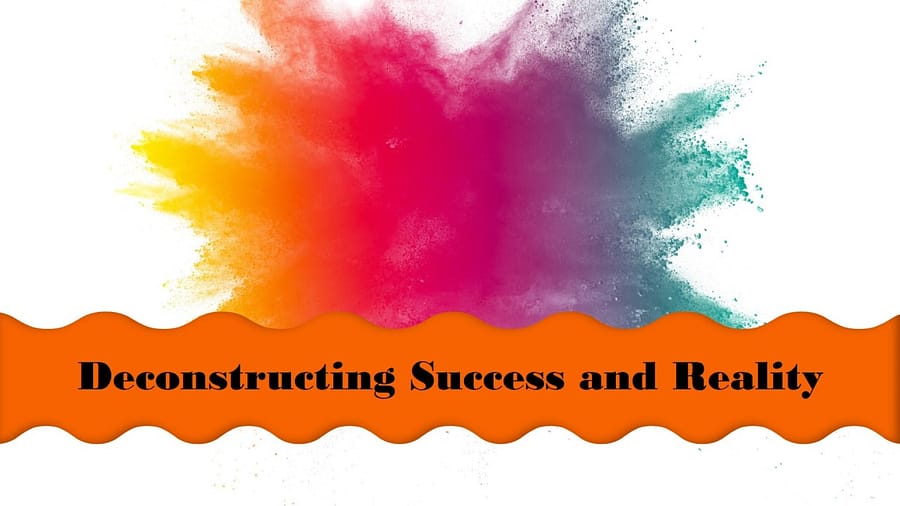In a world where success is often idolized as the ultimate goal, it is essential to pause and question its true meaning. What does it mean to succeed? Is it a necessity? And how does our understanding of success shape our reality? By deconstructing the concept of success, we uncover its deeply subjective nature and explore how it intertwines with the reality we perceive and create.
Challenging Conventional Success

Success is commonly defined as the achievement of goals—often material wealth, social status, or professional accomplishments. This conventional view, deeply embedded in our collective psyche, tends to reduce success to a set of external markers. Yet, this narrow definition overlooks the complexities of human experience and the diverse paths individuals may take to find fulfillment.
Philosophically, success transcends material accumulation or societal recognition. It is an ongoing journey of self-discovery, growth, and the realization of one’s potential. Importantly, this journey is not linear; its milestones are personal, and its destination is ever-changing. What one considers success today may differ tomorrow, reflecting the fluid nature of human aspirations and experiences.
The challenge, therefore, lies in redefining success in a way that aligns with our values rather than conforming to societal pressures. Success should be a manifestation of our authentic selves, not merely a response to external expectations.
Is Success Necessary?
Is success a requisite for a meaningful life? This question invites deep reflection. While the pursuit of success can motivate and inspire, it can also trap individuals in a cycle of endless striving, where contentment remains elusive. The belief that success is necessary often stems from societal conditioning, equating success with happiness and self-worth.
However, this belief is far from universal. Philosophical traditions such as Stoicism and Buddhism suggest that success, as conventionally understood, is not essential for a fulfilling life. These philosophies emphasize inner peace, contentment, and living in accordance with one’s true nature. In this context, success is seen as an illusion—a fleeting state that does not necessarily lead to lasting satisfaction.
This perspective urges us to reconsider whether societal definitions of success are truly aligned with a fulfilling life. Perhaps the real necessity is finding peace within oneself and living in harmony with one’s values, rather than constantly chasing an elusive ideal.
Rethinking the Benchmark of Success
Success is often measured by external benchmarks: financial stability, career advancement, and social recognition. However, these measures are not universal; they are shaped by cultural narratives and historical contexts that may not resonate with everyone’s personal values.
For example, in many Western societies, success is equated with individual achievement and material wealth. In contrast, Eastern philosophies often prioritize collective well-being and spiritual growth as the true measures of a successful life. This diversity in benchmarks underscores the subjective nature of success and highlights the importance of defining it on one’s terms.
Aristotle’s concept of “eudaimonia,” or flourishing, offers an alternative benchmark. According to Aristotle, success is not about accumulating wealth or achieving status, but about living a virtuous life and realizing one’s full potential. This idea challenges us to consider whether our benchmarks of success are leading us toward genuine fulfillment or merely conforming to societal constructs.
Embracing Failure as Part of Success
In a world obsessed with success, failure is often perceived as the ultimate defeat. However, failure is not the antithesis of success; it is an integral part of the journey. Many of history’s greatest successes were born out of failure, and the lessons learned from setbacks often prove more valuable than the achievements themselves.
The fear of failure is a powerful force that can stifle creativity, limit potential, and lead to a life of regret. Yet, when we embrace failure as a natural aspect of the journey, we begin to see it not as a sign of inadequacy, but as an opportunity for growth and self-improvement.
Existentialist philosophers like Jean-Paul Sartre and Albert Camus argue that life’s meaning is not predetermined; it is something we create through our choices and actions. From this perspective, failure is not a sign of defeat, but a step toward creating our meaning and purpose. It reminds us that success is not about avoiding failure, but about persevering through it.
Reality and the Reinterpretation of Success
As we deconstruct the concept of success, we must also consider how it shapes our reality. Our perceptions of success influence how we live, the choices we make, and how we view ourselves and others. If success is defined by external validation, our reality becomes one of constant comparison, competition, and dissatisfaction. However, if we redefine success as living authentically and aligning with our values, our reality shifts to one of contentment, peace, and fulfillment.
Ultimately, the reality we create is a reflection of the success we choose to pursue. By redefining success on our terms, we can craft a reality that is true to ourselves, rather than one dictated by societal expectations.
Conclusion: A New Perspective on Success and Reality
The deconstruction of success reveals that it is not a universal truth but a construct shaped by societal norms, cultural values, and personal beliefs. Success, as commonly understood, is not a necessity for a fulfilling life. What truly matters is living in alignment with one’s values, embracing the journey with all its successes and failures, and creating a reality that reflects one’s authentic self.
In this light, success is not a destination but a journey—a journey that involves making choices that lead to a life of authenticity, meaning, and fulfillment. It is in this journey, not in the societal benchmarks of success, that we find our true essence.
As we face the inevitable reality of death, it is not our successes that define us but the lives we lead and the reality we create. This is the true measure of success, and in this measure, there is no failure—only the continuous unfolding of our unique paths.
